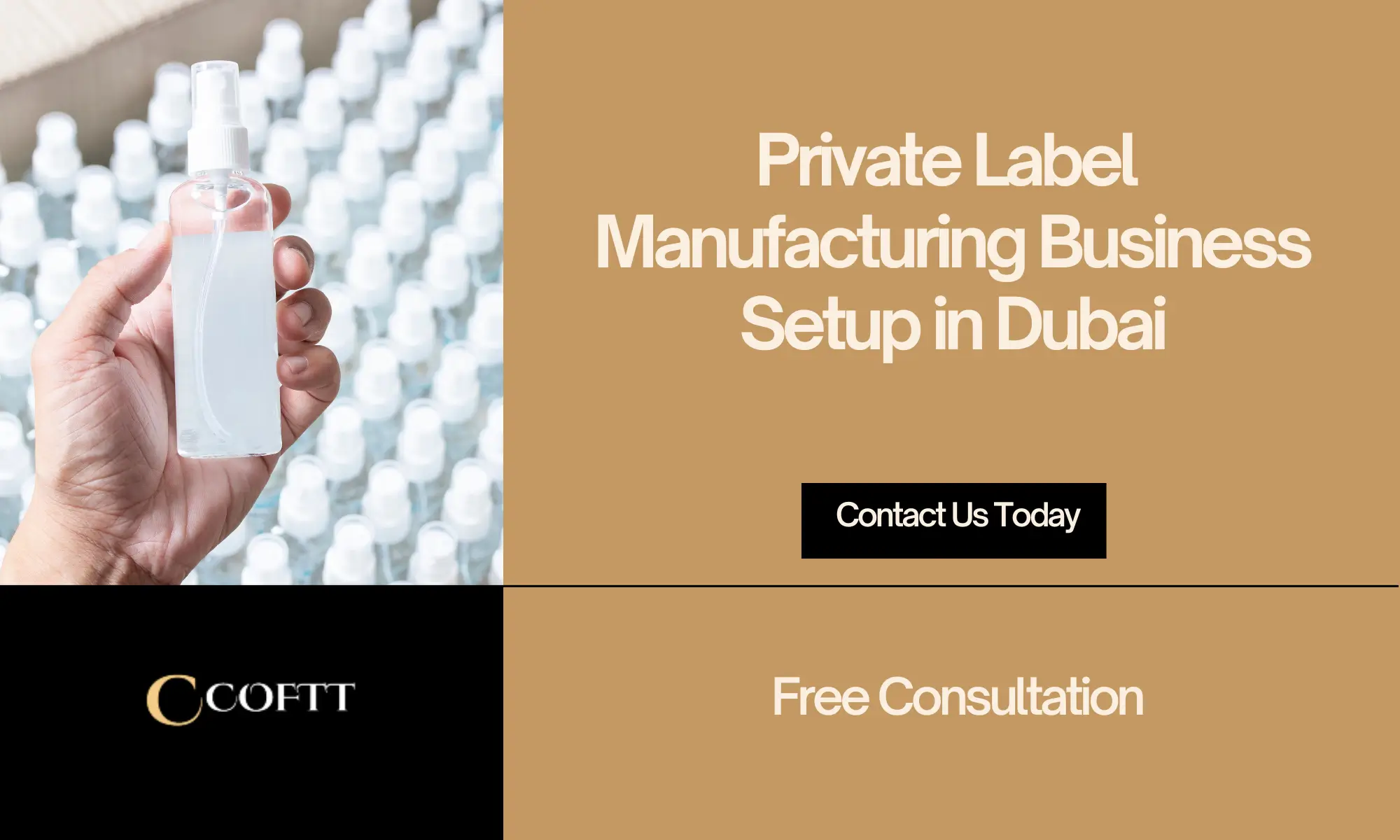business
.svg)
business
.svg)
business
.svg)
business
.svg)
business
.svg)
business
.svg)
COFTT helps you start and grow your business - hassle-free, legal, and done right.

Private label manufacturing has quietly become one of the most profitable industries in the world. Did you know that more than 50 percent of products on Amazon are sold under private labels? In Dubai, this trend is picking up faster than ever. Many entrepreneurs are not just starting e-commerce brands but also moving into manufacturing.
Instead of building their own consumer brand, they are producing high-quality products for others and letting clients put their name on it. Isn’t that a powerful model?
Dubai has positioned itself as a global manufacturing hub, especially in niches like clothing, cosmetics, and supplements. With advanced logistics, modern Free Zones, and tax benefits, it is the perfect place to set up a private label manufacturing unit.
Private label manufacturing means you, as the manufacturer, produce goods that other companies sell under their brand. You make the product, they market and sell it. Your job is to ensure quality, consistency, and timely supply.
For example, you could produce women’s dresses for fashion brands. The design, stitching, and packaging are done by your unit. The client simply adds their label, logo, and marketing.
Most entrepreneurs confuse private label and white label, but the difference is very important. In private label manufacturing, you produce a product exclusively for one retailer, and it carries only their brand name.
For example, if a clothing retailer wants a line of shirts that no one else can sell, you manufacture it under their label alone.
On the other hand, white label manufacturing allows you to produce a generic product that can be sold to many retailers, each rebranding it as their own. Think of skincare creams or supplements that multiple stores sell under different names, that’s white label.
1. You don’t need to spend money on building a brand.
2. You can work with multiple clients at the same time, scaling production as demand grows.
Dubai is not the cheapest place to manufacture, but it is one of the smartest places. Here is why:
Global Trade Hub – Easy access to Europe, Africa, Asia, and GCC markets.
Tax Benefits – Free Zones offer 0 percent corporate tax, plus duty-free re-export.
Modern Facilities – Specialized Free Zones for textiles, cosmetics, and food production.
Trust Factor – “Made in Dubai” is becoming a quality stamp for international buyers.
Statistics show that Dubai’s manufacturing sector contributes 11 percent to the GDP, and private label is one of the fastest-growing parts of it.
To become a private label supplier, you need a proper legal and operational setup. The process is structured but requires the right steps:
Free Zone manufacturing license: More cost-effective, starting around AED 35,000 to 50,000. Ideal if you want to export globally.
Mainland license: Slightly more expensive, starting at AED 60,000. This gives you direct access to the UAE local market.
Clothing requires fewer approvals, mainly trade license and municipality compliance.
Cosmetics need Dubai Municipality and Health approvals.
Supplements and food items require Dubai Health Authority and Food Control approvals.
You will need either your own small factory or a contract facility in a Free Zone. Many Free Zones offer ready-to-use industrial warehouses. These come with electricity, water, and permits, so you can start quickly.
Tailors, designers, quality controllers, and packaging staff are crucial. Dubai makes it easy to bring labor from South Asia and other regions at competitive costs.
Example: Private Label Clothing Manufacturing
Let us take the example of women’s clothing. Suppose you want to set up a small unit in Dubai to produce dresses for European fashion brands.
1. You rent a facility in Dubai Textile City Free Zone.
2. You hire 10 skilled tailors and 2 designers.
3. You produce 500 dresses per week, in different cuts and fabrics.
4. Clients from London or Paris send you their specifications. You manufacture, tag with their brand label, and export directly.
5. The client does not worry about production or logistics. You handle everything. Your profit comes from efficient production and volume scaling.
1. Clothing and fashion wear
2. Cosmetics and skincare products
3. Nutritional supplements
4. Perfumes and fragrances
5. Baby products
6. Fitness equipment and accessories
7. Home textiles
8. Organic food products
9. Footwear and leather goods
10. Men’s grooming products
The demand is strong. A report shows that private label sales in the Middle East are growing at 9 percent annually. Clothing, supplements, and cosmetics are leading categories. European and US brands especially look for Dubai-based suppliers because of easy re-export routes.
Setting up a private label unit requires strategy, approvals, and the right Free Zone choice. This is where CSPzone and COFTT step in. We guide you through:
- Choosing the right Free Zone or Mainland license.
- Navigating approvals for cosmetics, supplements, and food.
- Connecting you with suppliers of fabrics, raw materials, and packaging.
- Building a financial model to forecast profits.
- Helping with staffing and logistics setup.
Private label manufacturing in Dubai is more than just a business. It is a scalable model that allows you to become a supplier for global brands. Clothing, cosmetics, and supplements are the most profitable segments, and Dubai gives you the infrastructure to build a professional unit that customers trust.
If you are ready to start, the opportunity is wide open. You are not just producing products, you are producing brands for others. Isn’t that the most sustainable business model?

Learn how to start a private label manufacturing unit in Dubai. Learn the demand in e-commerce, top product ideas like clothing, cosmetics, and supplements, and how to set up your facility with COFTT’s expert guidance.